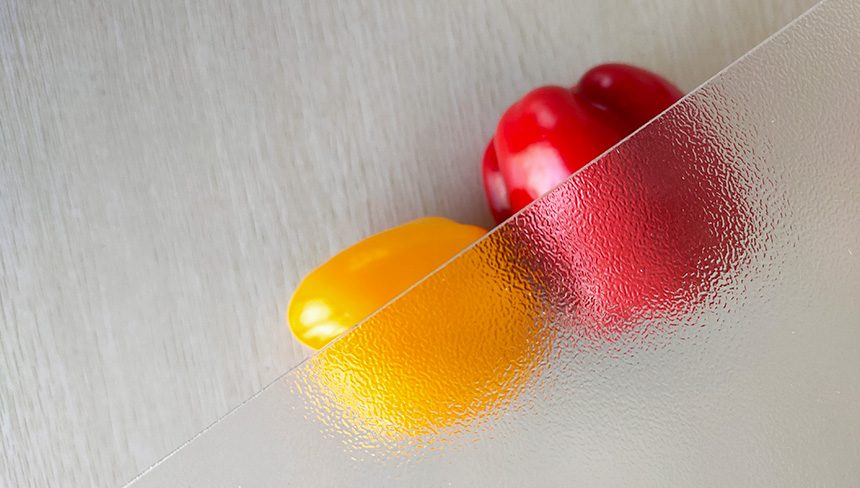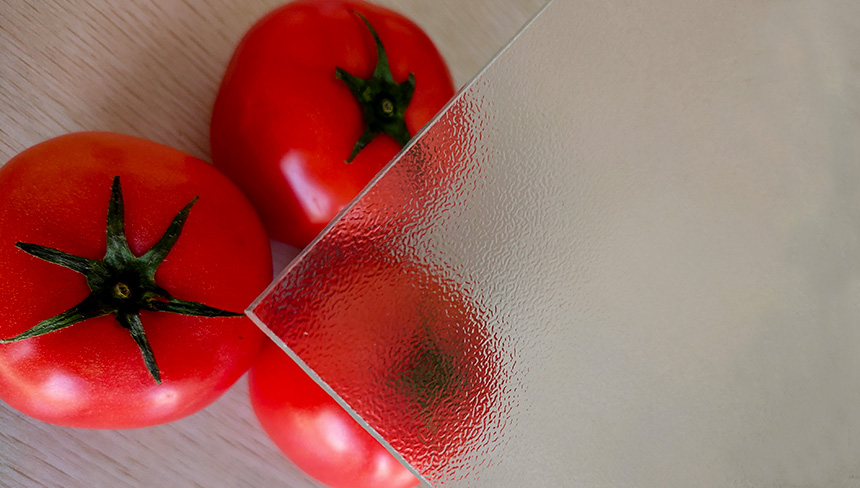
The effect of diffuse glass in agricultural smart farm greenhouse on crops
Greenhouse crops have many advantages over traditional crops, but the disadvantage is that whether it is plastic film greenhouses or more advanced glass greenhouses, they have more or less affected the light, and the transmittance of plastic film to light is about 60%~ 70%, the light transmittance of ultra-white float glass is about 91%. However, sunlight is also one of the most important factors affecting crop yields, that is, more sunlight means more harvest. Increase the light transmittance, and the yield of crops can be increased.

Diffuse Glass 50 Haze (2 sides AR optional)
The application of diffuse glass greatly improves the transmittance of light. By changing the pattern of the glass surface and anti-reflection technology, the direct light passing through the glass medium is scattered in all directions, and the sunlight is changed into scattered light to enter the greenhouse to the maximum. , Improve the coverage of light in the greenhouse, avoid shadows that cause other crops to fail to obtain effective photosynthesis, and further increase planting density, increase crop photosynthesis, and increase crop production. At the same time, the scattered light can avoid the photosynthesis (photoinhibition effect) caused by the overheating of the irradiated crops, and even the problems such as burns, withering, and withering (abscisic acid).

Diffuse Glass 50 Haze (2 sides AR optional)
Through tests, Dutch agricultural scientists found that greenhouses using diffuse glass increased the yield by more than 20% (tomatoes, cucumbers, lettuce, strawberries) than transparent float glass greenhouses; and the fruit's vitamin C, vitamin E, and soluble sugar content greatly increased.
Tags:anti-reflective glass diffuse glass agricultural greenhouses glass greenhouse venlo greenhouse AR glass greenhouses glass agricultural glass horticultural glass #greenhouseglass #Antireflectiveglass #Diffusetemperedglass #Ultrawhitefloatglass #agriculturalgreenhouseglass #diffuseglass #horticulturalglass #Tomatogreenhouse #Coloredpeppergreenhouse #Lettucegreenhouse #Agriculturalgreenhouse #ARglass #venlogreenhouse #greenhouseglass #Antireflectiveglass #Diffusetemperedglass #Ultrawhitefloatglass #agriculturalgreenhouseglass #diffuseglass #horticulturalglass #Tomatogreenhouse #Coloredpeppergreenhouse #Lettucegreenhouse #Agriculturalgreenhouse #ARglass #venlogreenhouse #GlassManufacturer #invernadero #ArchitecturalGlass #ClearFloatGlass #FloatGlass
Previous:Characteristics of ultra-white diffuse glass in agricultural smart greenhouse
Next:Advantages of tempered anti-reflective glass for agricultural and horticultural greenhouses



















